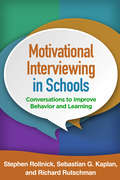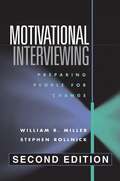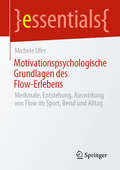- Table View
- List View
Motivational Interviewing in Schools: Conversations to Improve Behavior and Learning
by Stephen Rollnick Richard Rutschman Sebastian G. KaplanThe first teacher's guide to the proven counseling approach known as motivational interviewing (MI), this pragmatic book shows how to use everyday interactions with students as powerful opportunities for change. MI comprises skills and strategies that can make brief conversations about any kind of behavioral, academic, or peer-related challenge more effective. Extensive sample dialogues bring to life the "dos and don'ts" of talking to K-12 students (and their parents) in ways that promote self-directed problem solving and personal growth. The authors include the distinguished codeveloper of MI plus two former classroom teachers. User-friendly features include learning exercises and reflection questions; additional helpful resources are available at the companion website. Written for teachers, the book will be recommended and/or used in teacher workshops by school psychologists, counselors, and social workers.
Motivational Interviewing in Social Work Practice
by Melinda HohmanMotivational interviewing (MI) offers powerful tools for helping social work clients draw on their strengths to make desired changes in their lives. This reader-friendly book introduces practitioners and students to MI and demonstrates how to integrate this evidence-based method into direct practice. Melinda Hohman and her associates describe innovative applications for diverse clients and practice areas, including substance abuse treatment, mental health, child welfare, community organizing, and others. Extensive sample dialogues illustrate MI skills in action with individuals and groups. The book also presents best practices for MI training, teaching, and agency-wide integration.
Motivational Interviewing in Social Work Practice, Second Edition (Applications of Motivational Interviewing)
by Melinda HohmanThe definitive text on motivational interviewing (MI) written by and for social workers has now been updated and expanded with 60% new material, including a revised conceptual framework, cutting-edge applications, and enhanced pedagogical features. Melinda Hohman and her associates demonstrate what MI looks like in action, how it transforms conversations with clients, and how to integrate it into social work practice in a wide range of settings. Extensive new case examples and annotated sample dialogues bring the concepts to life, helping readers build their own repertoires of MI skills. The book also summarizes the research base for MI and shares expert recommendations for teaching, training, and professional development. New to This Edition *Expanded and restructured around the current four-process model of MI (engaging, focusing, evoking, and planning). *Content is explicitly linked to the Council on Social Work Education's Educational Policy and Accreditation Standards (EPAS) and the Grand Challenges for Social Work. *Chapter on MI through the lens of critical race theory. *Chapter on innovative applications in the areas of trauma, food insecurity, and environmental justice. *Additional pedagogical features--"Voices from the Field" boxes written by social workers in a variety of roles, and end-of-chapter reflection questions. This book is in the Applications of Motivational Interviewing series, edited by Stephen Rollnick, William R. Miller, and Theresa B. Moyers.
Motivational Interviewing in the Treatment of Anxiety
by Henny A. WestraThis wise and practical book provides effective strategies for helping therapy clients with anxiety resolve ambivalence and increase their intrinsic motivation for change. The author shows how to infuse the spirit and methods of motivational interviewing (MI) into cognitive-behavioral therapy or any other anxiety-focused treatment. She describes specific ways to use MI as a pretreatment intervention or integrate it throughout the course of therapy whenever motivational impasses occur. Vivid clinical material--including a chapter-length case example of a client presenting with anxiety and depression--enhances the utility of this accessible guide. This book is in the Applications of Motivational Interviewing series.
Motivational Interviewing in the Treatment of Anxiety
by Henny A. WestraThis practical book provides effective strategies for helping therapy clients with anxiety resolve ambivalence and increase their intrinsic motivation for change. The author shows how to infuse the spirit and methods of motivational interviewing (MI) into cognitive-behavioral therapy or any other anxiety-focused treatment. She describes specific ways to use MI as a pretreatment intervention or integrate it throughout the course of therapy whenever motivational impasses occur. Vivid clinical material--including a chapter-length case example of a client presenting with anxiety and depression--enhances the utility of this accessible guide. This book is in the Applications of Motivational Interviewing series.
Motivational Interviewing in the Treatment of Psychological Problems
by Henny Westra Hal ArkowitzSince the publication of Miller and Rollnick's classic Motivational Interviewing, MI has become hugely popular as a tool for facilitating many different kinds of positive behavior change. MI is increasingly being used to help individuals mobilize their energy, commitment, and personal resources for addressing a wide range of mental health concerns. This cutting-edge book brings together leading experts to describe MI applications in the treatment of anxiety, depression, PTSD, suicidal behavior, obsessive-compulsive disorder, eating disorders, gambling addictions, schizophrenia, and dual diagnoses. Also addressed are MI approaches in the criminal justice system. Each chapter provides a concise overview of the disorder or population under discussion; describes how MI has been integrated with standard treatment approaches; illustrates the nuts and bolts of intervention, using vivid clinical examples; and reviews the empirical evidence base.
Motivational Interviewing in the Treatment of Psychological Problems (Applications of Motivational Interviewing Series)
by Hal Arkowitz Brian L. Burke Brad LundahlWith 75% new material, the fully revised third edition of this clinical reference and text describes ways to integrate motivational interviewing (MI) into evidence-based psychotherapy and counseling. Readers learn how MI concepts and tools can enhance their foundational skills as helpers--and can be tailored for clients with depression, anxiety disorders, addictions, posttraumatic stress disorder, and other frequently encountered problems. Chapters are grounded in research on what works for particular disorders. Vivid case examples illustrate the role that MI can play in helping clients at any stage of treatment to resolve ambivalence and mobilize their energy, commitment, and personal resources for change. New to This Edition *Chapters on culturally responsive MI, trauma-informed practices, and MI in child welfare. *Chapters on treating chronic pain and serious mental illness. *Key developments in MI, as well as current psychological research. *Extensive annotated sample dialogues throughout the chapters. This book is in the Applications of Motivational Interviewing series, edited by Stephen Rollnick, William R. Miller, and Theresa B. Moyers.
Motivational Interviewing in the Treatment of Psychological Problems, Second Edition (Applications of Motivational Interviewing)
by Stephen Rollnick William R. Miller Hal ArkowitzThis authoritative guide has given tens of thousands of clinicians proven tools for helping clients resolve ambivalence and mobilize their energy, commitment, and personal resources for change. Leading experts describe ways to combine motivational interviewing (MI) with other treatments for a wide range of psychological problems, including depression, anxiety disorders, eating disorders, posttraumatic stress disorder, and others. Chapters illustrate the nuts and bolts of intervention, using vivid clinical examples, and review the empirical evidence base. Contributors show how to tailor MI to each population's needs, whether used as a pretreatment or throughout the course of therapy. New to This Edition *Many new authors; extensively revised with the latest theory, practices, and research. *Chapters on domestic violence, addictions, and smoking cessation with adolescents. *Chapter on transdiagnostic treatment.
Motivational Interviewing with Adolescents and Young Adults
by Sylvie Naar-King Mariann SuarezThis pragmatic guide spells out how to use motivational interviewing (MI) to have productive conversations about behavior change with adolescents and young adults in any clinical context. Filled with vivid examples, sample dialogues, and "dos and don'ts," the book shows how conducting MI from a developmentally informed standpoint can help practitioners quickly build rapport with young patients, enhance their motivation to make healthy changes, and overcome ambivalence. Experts on specific adolescent problems describe MI applications in such key areas as substance abuse, smoking, sexual risk taking, eating disorders and obesity, chronic illness management, and externalizing and internalizing behavior problems.
Motivational Interviewing with Adolescents and Young Adults, Second Edition (Applications of Motivational Interviewing)
by Mariann Suarez Sylvie NaarThe significantly revised second edition of this unique practitioner guide features 65% new material and a new organizing structure. The authors show how to use motivational interviewing (MI) to have productive conversations about behavior change with adolescents and young adults in any clinical context. Noted for its clarity, the book includes extended case examples, sample dialogues, quick-reference tables, and "dos and don'ts." It provides vital tools for helping young people open up about their struggles, explore alternatives, and make healthier choices around such concerns as substance use, smoking, anxiety, medication adherence, and obesity. New to This Edition *More integrative and cohesive: every chapter weaves in diverse clinical issues, replacing the prior edition's population-specific chapters. *Chapters on MI in groups and involving caregivers in treatment. *Restructured around the current four-process model of MI, and proposes maintenance of change as a fifth process. *Incorporates the rapidly growing research base on MI with youth. *Reflects the ongoing refinement of the authors' training approach; includes skill-building activities at the end of each chapter. This book is in the Applications of Motivational Interviewing series, edited by Stephen Rollnick, William R. Miller, and Theresa B. Moyers.
Motivational Interviewing with Families (Applications of Motivational Interviewing Series)
by Douglas C. SmithWhile motivational interviewing (MI) was developed as a counseling approach for individuals, it also has tremendous utility for helping families change and grow. This book offers the first comprehensive guide to adapting MI skills to engage families--including reluctant members--in therapy and mobilize family-level change processes. Extensive annotated sample dialogues show how MI can be integrated with any therapy approach for families struggling with mental health problems, addictions, relationship challenges, difficult life transitions, or other concerns. Special features include boxed sidebars, reflection questions, and practice exercises. The Appendix and companion website provide additional helpful resources for using MI with families. This book is in the Applications of Motivational Interviewing series, edited by Stephen Rollnick, William R. Miller, and Theresa B. Moyers.
Motivational Interviewing with Offenders: Engagement, Rehabilitation, and Reentry
by Jill D. Stinson Michael D. ClarkFrom experts on working with court-mandated populations, this book shows how motivational interviewing (MI) can help offenders move beyond resistance or superficial compliance and achieve meaningful behavior change. Using this evidence-based approach promotes successful rehabilitation and reentry by drawing on clients' values, goals, and strengths--not simply telling them what to do. The authors clearly describe the core techniques of MI and bring them to life with examples and sample dialogues from a range of criminal justice and forensic settings. Of crucial importance, the book addresses MI implementation in real-world offender service systems, including practical strategies for overcoming obstacles. This book is in the Applications of Motivational Interviewing series.
Motivational Interviewing, Second Edition
by Stephen Rollnick William MillerThis bestselling work has introduced hundreds of thousands of professionals and students to motivational interviewing (MI), a proven approach to helping people overcome ambivalence that gets in the way of change. William R. Miller and Stephen Rollnick explain current thinking on the process of behavior change, present the principles of MI, and provide detailed guidelines for putting it into practice. Case examples illustrate key points and demonstrate the benefits of MI in addictions treatment and other clinical contexts. The authors also discuss the process of learning MI. The volume's final section brings together an array of leading MI practitioners to present their work in diverse settings. New to This Edition Expanded 11 new chapters. Incorporates the growing body of outcome research. More applications of MI within and beyond the addictions field. Coverage of MI and the stages-of-change model; applications in medical, public health, and criminal justice contexts; and the use of MI with groups, couples, and adolescents.
Motivational Interviewing, Third Edition: Helping People Change (Applications of Motivational Interviewing)
by Stephen Rollnick William R. MillerThis bestselling work for professionals and students is the authoritative presentation of motivational interviewing (MI), the powerful approach to facilitating change. The book elucidates the four processes of MI, engaging, focusing, evoking, and planning and vividly demonstrates what they look like in action. A wealth of vignettes and interview examples illustrate the "dos and don'ts" of successful implementation in diverse contexts. Highly accessible, the book is infused with respect and compassion for clients. The companion Web page provides additional helpful resources, including reflection questions, an extended bibliography, and annotated case material. This book is in the Applications of Motivational Interviewing series. New to This Edition Reflects major advances in understanding and teaching MI. Fully restructured around the new four-process model. Additional case examples and counseling situations. Reviews the growing evidence base and covers ways to assess MI fidelity. Pedagogical Features Include Online reflection questions and annotated cases, ideal for classroom discussion. Key points at the end of each chapter. Engaging boxes with special topics and personal reflections. Extended bibliography and quick-reference glossary.
Motivational Interviewing: Helping People Change and Grow (Applications of Motivational Interviewing)
by Stephen Rollnick William R. MillerNow in a fully rewritten fourth edition, this is the authoritative presentation of motivational interviewing (MI), the powerful approach to facilitating change. It has been updated and streamlined to be even more user-friendly as a practitioner guide and course text. MI originators William R. Miller and Stephen Rollnick elucidate the four tasks of MI--engaging, focusing, evoking, and planning--and vividly demonstrate what they look like in action. A wealth of vignettes and interview examples illustrate the dos and don'ts of successful implementation in diverse contexts. The book reviews the evidence base for the approach and covers ways to assess the quality of MI. The companion website provides reflection questions, annotated case material, and additional helpful resources. New to This Edition *Most of the book is entirely new. *Addresses the breadth of MI applications not only in counseling and psychotherapy, but also in health care, education, coaching, management, and other contexts. *Discusses delivering MI remotely, simple versus complex affirmations, strategic use of directional questions, ethical considerations, and other new or expanded topics. *Increased emphasis on using MI throughout a client's process of change and growth, not just in the preparatory stage. Pedagogical Features *New or updated online materials, including reflection questions and annotated cases. *Key points at the end of each chapter. *"Personal Perspective" and "For Therapists" boxes in every chapter. *Extensive glossary. *New self-assessment tool that targets the component skills of MI. This book is in the Applications of Motivational Interviewing series, edited by Stephen Rollnick, William R. Miller, and Theresa B. Moyers.
Motivational Interviewing: Preparing People for Change (2nd edition)
by Stephen Rollnick William R. MillerHelping people with substance abuse and/or compulsive behavior problems, through counseling and interviewing
Motivational Motives
by LaQuon S. JohnsonThis book is a composite of parables put forth and prepared to help the reader confront childhood trauma and manage the inevitable circumstances of life. Many of the characters of Motivational Motives were placed or conveniently placed themselves in a proverbial bubble that can be popped by anyone labeled as an authority figure, powerful, or better than the masses based on race, creed, economic status, or permissible accolade. The context of the manuscript encourages the reader to examine and place themselves in the position of the characters and truly identify the Motivational Reasoning for their Initiative (MRI).
Motivational Profiles in TIMSS Mathematics: Exploring Student Clusters Across Countries and Time (IEA Research for Education #7)
by Gavin T. Brown Michalis P. Michaelides Hanna Eklöf Elena C. PapanastasiouThis open access book presents a person-centered exploration of student profiles, using variables related to motivation to do school mathematics derived from the IEA’s Trends in International Mathematics and Science Study (TIMSS) data. Statistical cluster analysis is used to identify groups of students with similar motivational profiles, across grades and over time, for multiple participating countries.While motivational variables systematically relate to school outcomes, linear relationships can obscure the diverse makeup of student subgroups, each with varying combinations of motivation, emotions, and attitudes. In this book, a person-centered analysis of distinct and meaningful motivational profiles and their differences on sociodemographic variables and mathematics performance broadens understanding about the role that motivation characteristics play in learning and achievement in mathematics. Exploiting the richness of IEA’s TIMSS data from many countries, extracted clusters reveal consistent, as well as certain nuanced patterns that are systematically linked to sociodemographic and achievement measures. Student clusters with inconsistent motivational profiles were found in all countries; mathematics self-confidence then emerged as the variable more closely associated with average achievement. The findings demonstrate that teachers, researchers, and policymakers need to take into account differential student profiles, prioritizing techniques that target skill and competence in mathematics, in educational efforts to develop student motivation.
Motivationspsychologie für die Berufspraxis: Praktisches Wissen für Coaches, Berater und Führungskräfte (essentials)
by Johannes MoskaliukJohannes Moskaliuk stellt praxiserprobte und wirksame Methoden vor, die beim Erreichen von persönlichen Zielen unterstützen und dazu beitragen, die Motivation aufrechtzuerhalten. Grundlage sind aktuelle Theorien aus der Motivations- und Handlungspsychologie. Dabei geht er jeweils auf theoretische Grundlagen ein und leitet daraus konkrete Empfehlungen für die Praxis ab. In jedem Kapitel finden sich Links zu Coaching-Tools und Checklisten, die eingesetzt werden können, um Mitarbeitende und Klienten beim Erreichen von beruflichen und privaten Zielen zu unterstützen.
Motivationspsychologische Grundlagen des Flow-Erlebens: Merkmale, Entstehung, Auswirkung von Flow im Sport, Beruf und Alltag (essentials)
by Michele UferDas Thema Flow ist in aller Munde. Wer im Flow ist, scheint leistungsfähiger, erfolgreicher, glücklicher zu sein. Was genau Flow jedoch aus psychologischer Sicht bedeutet, scheint nicht immer so klar zu sein. Befeuert wird dies durch den inflationären Gebrauch des Wortes: Es gibt Flow-Yoga, Flow-Food, Flow-Möbel und Flow-Coachings. Letztere versprechen oft den einfachen Weg zum Erfolg, vereinfachen manche Sachverhalte aber zu sehr. Michele Ufer fasst deshalb zusammen, was sich jenseits von Marketing-Slang hinter dem Begriff verbirgt und welche zentralen Erkenntnisse die Flow-Forschung zutage gefördert hat. Leitfragen unterstützen Selbstreflexion und Alltagstransfer.Der Autor: Dr. Michele Ufer ist international gefragter Sportpsychologe, Mentaltrainer und Vortragsredner. Er begleitet Sportler, Manager, Coaches und andere High Performer bei ihren spezifischen Themen wie Mentale Stärke, Flow, Spitzenleistung unter Stress und extremen Bedingungen, Führungs- und Grenzkompetenz. Er testet als erfolgreicher Extremläufer seine Strategien auch regelmäßig am eigenen Leib und erzielte wiederholt Top 10-Platzierungen bei weltweiten Wettkämpfen.
Motive bei der Integration von Geschlechtlichkeit und Sexualität bei adoleszenten Männern: Eine handlungspsychologische Studie
by Markus HoffmannGegenstand der Studie ist die Integration von Geschlechtlichkeit und Sexualität adoleszenter Männer im Kontext von Alltag und Alltagshandlungen. Auf der Basis der handlungstheoretischen Entwicklungspsychologie wird in dieser qualitativen Forschungsarbeit die These vertreten, dass der Adoleszente das Werk seiner selbst ist, der die Entwicklung und die Integration seiner Sexualität und Geschlechtsidentität im Alltag vorantreibt. An der Studie nahmen 50 Männer im Alter von 13 bis 25 Jahren teil. Die Arbeit zeigt, wie sich die Motive, die Entwicklungsaufgaben und Bewältigungs- und Handlungsformen bei der Integration der körperlichen Veränderung, der Entwicklung von romantischen Beziehungen, dem Lernen von Sexualität und der Entwicklung der Geschlechtsrolle über die Spanne der Adoleszenz aus der Sicht junger Männer verändern. Durch die Generierung von Handlungstypen machen die Ergebnisse die psychische und soziale Auseinandersetzung in verschiedenen Phasen der Adoleszenz sichtbar, wie deren Veränderung über die Zeit. Die Forschungsarbeit greift auf innovative Weise ein Thema von wissenschaftlicher und praktischer Relevanz auf, das bisher nicht in dieser differenzierten Form empirisch untersucht wurde.
Motive, Motivation und Ziele im Personal Performance Management: Grundlagen der persönlichen Leistungssteuerung
by Hendrik HilmerDieses Fachbuch gibt einen Einstieg in die Grundlagen des Personal Performance Managements, der persönlichen Leistungssteuerung. Es handelt von den verschiedenen inneren Antrieben, die uns dazu bewegen, etwas erreichen zu wollen. Die grundlegenden menschlichen Motive Macht, Anschluss und Leistung und deren Bedeutung für das Personal Performance Management werden vorgestellt. Diese Motive werden immer wieder durch kurzfristige Motivation überlagert. Die Kenntnis über die psychologischen Mechanismen kann uns dabei unterstützen, Motivation besser zu verstehen und für unsere Zwecke einzusetzen. Im beruflichen Kontext setzen wir oder andere uns häufig Ziele: Manchmal stimmen sie mit unseren Motiven überein, dann fällt es uns leicht sie zu verfolgen. Stehen sie im Widerspruch, wird es schwierig für uns. Das Verhältnis der definierten Ziele auf Übereinstimmung mit unseren wenig bekannten oder unterbewussten Motiven zu prüfen, ist eine wesentliche Kompetenz des Personal Performance Management.Das Buch richtet sich an alle, die Interesse an Selbstentwicklung und der persönlichen Leistungssteuerung haben, insbesondere an Fach- und Führungskräfte. Die vermittelten Grundlagen helfen, das eigene Handeln zu reflektieren und bewusster zu steuern. Reflexionsfragen zu Beginn jedes Themenschwerpunktes unterstützen bei der eigenen Standortbestimmung und geben Anregungen für das eigene Personal Performance Management.Der InhaltPerformance Management, Leistung und MotivationGrundlegende Motive menschlichen Handelns: Macht, Anschluss, LeistungMotivation und EmotionenFlow und Selbstbestimmung im Personal Performance ManagementDas Verhältnis von Zielen und Motiven
Motiverende gespreksvoering voor sociaalagogisch werk: Coachen bij gedragsverandering
by Michaela Veen Frank GoijartsHoe bouw je een werkbare relatie op? Hoe breng je cliënten zover dat ze er zelf voor kiezen hun gedrag te veranderen? Hoe zorg je ervoor dat ze het gevoel hebben stappen te kunnen zetten op weg naar kansrijker gedrag dat (uiteindelijk) hun eigen welzijn ten goede komt? Hoe bereik je dat het niet alleen bij plannen blijft, maar dat ze de ingezette verandering ook volhouden? Motiverende gespreksvoering voor sociaalagogisch werk biedt een toegankelijke en praktische vertaling van recente inzichten over het beïnvloeden van motivatie en gedrag naar de praktijk van het sociaalagogisch werkveld. 'Motivational Interviewing' zoals ontwikkeld door Miller & Rollnick vormt daarbij de belangrijkste leidraad. Dit boek biedt een gedegen theoretisch begrip van de diverse concepten die aan de gespreksmethode ten grondslag liggen, maar is vooral praktijkgericht. De verschillende stappen in de motiverende benadering worden duidelijk uiteengezet en toegelicht. Er zijn cases en voorbeelddialogen met een toelichting. Op de begeleidende website is aanvullend materiaal beschikbaar in de vorm van reflectievragen, verschillende videovoorbeelden uit de diverse werkvelden, aanvullende dialogen, opdrachten en toetsvragen.
Motives and Goals in Groups
by Alvin ZanderThe qualities and effectiveness of working groups are determined by the goals of the group and the motives of its members. In Motives and Goals In Groups, Alvin Zander studies the effects of group goals and the reasons why particular group goals are chosen. He examines the origins of such goals, determines their value in terms of the work of the group, and analyzes how goals are affected by members' aspirations to achieve success. Zander assumes the idea that the motives of members are not merely dispositions to obtain personal satisfaction, but are also inclinations to achieve group success.Earlier studies defined and clarified concepts about group achievement. They report on work in the laboratory, using high school students as subjects. In later investigations, these concepts were tested in groups outside the laboratory classrooms, executive boards, industrial crews, and business departments.In the new introduction, Zander brings his book up to date by analyzing members' motives and groups' goals from 1971 to the present day. He examines how current findings amplify results reported in the original book. Among the topics covered are: measurability of a group's objective; the degree of members' confidence in attaining the group's goal; the importance of a group's purpose; external pressures on a group's aspirations; and the reaction of members to their group's performance.Motives and Goals in Groups brings together earlier research for the first careful, scientific study of goals In groups. It is of continuing importance to psychologists, educators, social workers, executives, therapists, and all others who work either in or with groups.
Motives and Mechanisms: An Introduction to the Psychology of Action (Psychology Revivals)
by David Clarke Rom Harré Nicola De CarloAs the first introductory statement of the ‘new psychology’, Motives and Mechanisms, originally published in 1985, aims to bring the study of human action to the forefront of the subject. Like any science, the practice of psychology is very much influenced by the hidden assumptions of its practitioners. The argument put forward in this important text shows how these assumptions can be brought out by comparing psychology with the natural sciences and with common-sense understanding. In pursuing the integration of traditional research methods with a new style of investigation, the basic principle is that social structures and mental structures are in reciprocal relation with one another because each is involved in the creation of the other. By adopting this principle social structures become the basis for research into the cognitive and emotional organization of mind. The authors devote two key chapters to the central question that underlies this stance: are human actions and human actors’ products of internal processes, such as those described by Freud, or of external social forces, of the kind described by Mead?
